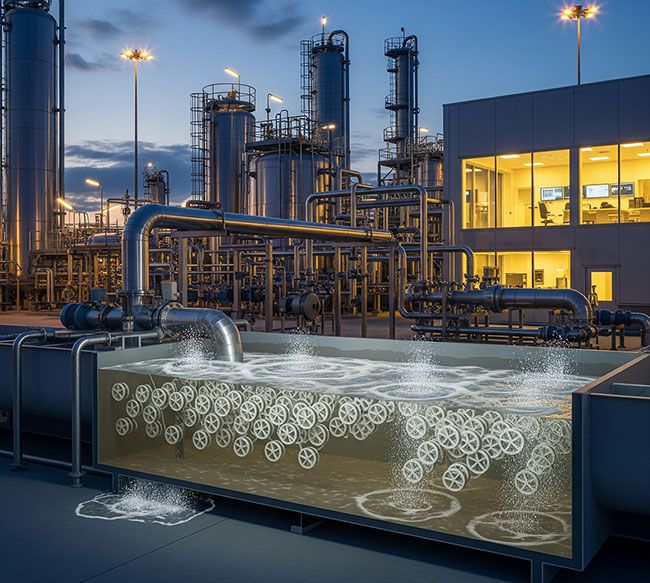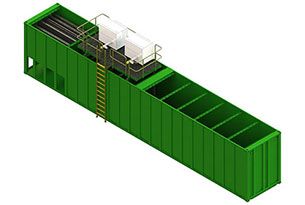The chemical manufacturing processes can generate wastewater streams that are among the most complex and hazardous in the world. Treating effluent containing toxic organic compounds, priority pollutants, and extreme pH levels requires a technology that is not just effective, but exceptionally resilient. The Moving Bed Biofilm Reactor (MBBR) is the ideal technology, providing a powerful biological solution to a difficult chemical problem.

The Volatile Nature of Chemical Wastewater
Unlike municipal or other industrial wastewater, chemical effluent is defined by its harsh and often unpredictable nature:
- High Toxicity: The presence of compounds like phenols, benzene, formaldehyde, and other solvents can be acutely toxic to the microorganisms used in conventional treatment systems.
- Recalcitrant Organics: Many synthetic organic chemicals are resistant to biological degradation, passing through traditional systems untreated.
- Extreme pH Swings: Batch processing and different production lines can lead to rapid and wide fluctuations in the wastewater's pH.
- Variable COD & BOD Loads: The concentration and composition of the effluent can change dramatically from hour to hour.
These factors can cause catastrophic failure in standard activated sludge plants, leading to non-compliance, environmental damage, and costly downtime.
MBBR: Engineered Biological Resilience
The genius of the MBBR system lies in its biofilm. By providing a massive, protected surface area on its media carriers, it cultivates a robust and highly specialized ecosystem of microorganisms. This is not a fragile, free-floating biomass; it is a fortified, attached-growth community.
This design allows for the development of slow-growing, highly specific bacteria and archaea that can metabolize complex and toxic compounds. The biofilm structure protects these vital microorganisms from sudden shocks in toxicity or pH, ensuring the system remains stable and effective even under the most challenging conditions.
Critical Advantages for Chemical Manufacturing
Unmatched Process Stability
MBBR systems can handle toxic shock loads and hydraulic surges that would decimate other biological processes, ensuring continuous and reliable treatment.
Targeted Pollutant Degradation
The system can be tailored to cultivate specific microbial populations that are highly effective at breaking down targeted recalcitrant compounds like phenols and other priority pollutants.
Reduced Sludge Production
MBBRs are highly efficient systems that typically produce less biological sludge than conventional activated sludge systems, reducing disposal costs.
Optimized Footprint, High Capacity
The technology's efficiency allows it to treat highly concentrated waste streams in a fraction of the space required by traditional methods, a major benefit for established plants.
A Catalyst for Sustainable Chemical Production
For chemical manufacturers, meeting stringent discharge permits is non-negotiable. MBBR technology offers the most reliable and efficient means of achieving compliance, even with the most challenging effluent.
By investing in a robust MBBR solution, chemical plants can mitigate environmental risk, ensure operational stability, and reinforce their commitment to sustainable manufacturing practices.
